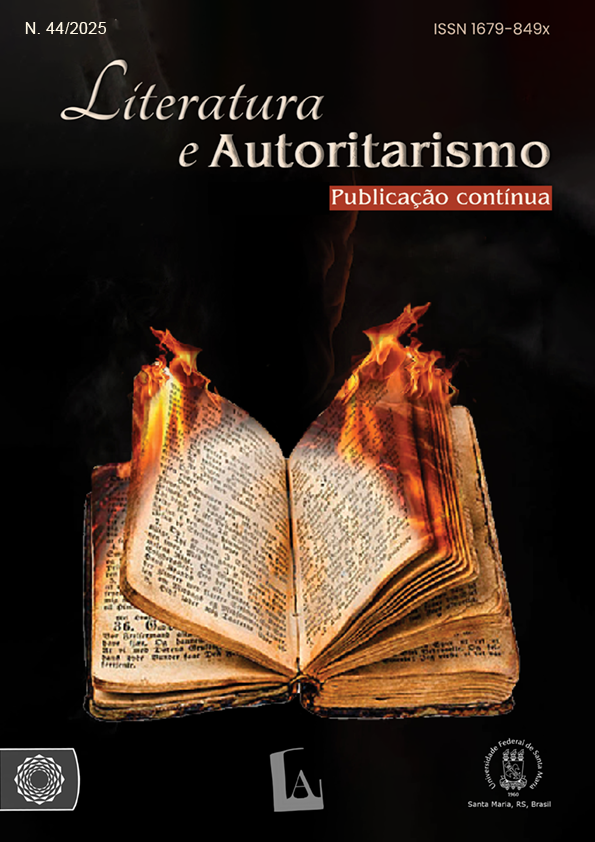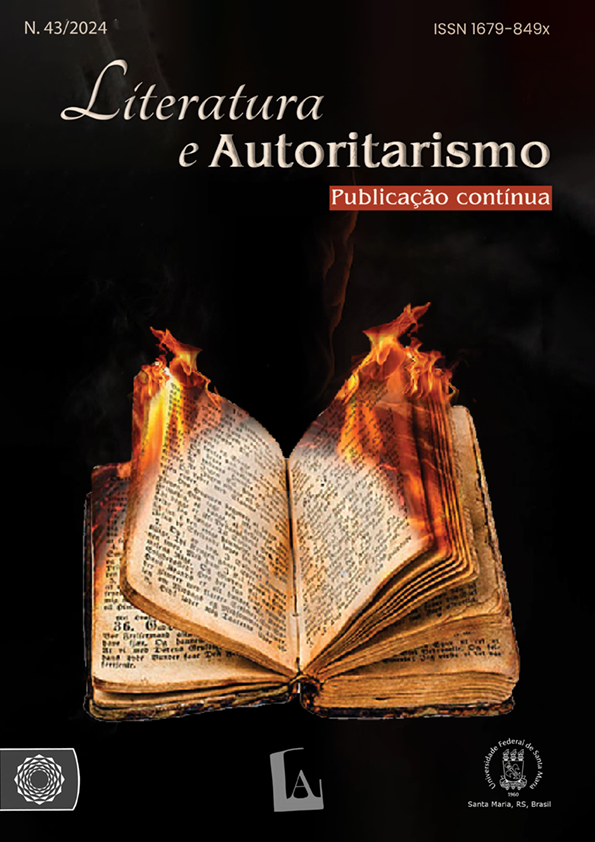Archives
-

Literatura e Autoritarismo: Distopias e outras formas narrativas
No. 42 (2023)A edição 42 da Revista Literatura e Autoritarismo disponibiliza aos seus leitores artigos que têm como objetos de análise diferentes formas narrativas, dentre as quais as distopias, em que o autoritarismo e a violência sobressaem. Ficções distópicas geralmente expõem cenários futuros e retratam uma ordem social opressora e ditatorial. O primeiro artigo desta edição traz justamente a temática das distopias, também já contemplada em outras edições desta Revista, como no Dossiê intitulado “Resistência e Distopia”, publicado em 2019, com cinco contribuições sobre o assunto.
-

Literature and Authoritarianism: On Violence in History
No. 41 (2023)Number 41 of the Revista Eletrônica Literatura e Autoritarismo reaches its readers based on a reflection that places violence in history not only as an element in dialogue with other situations, but highlighting its protagonism. And it is based on this understanding that the title of this edition seeks to reflect on violence in history in a way that integrates them inseparably.
-

The persistence of censorship
No. 40 (2022)This issue includes articles that discuss, among other relevant topics, censorship and its persistence in Brazilian culture and also in other cultures.
-

Resistance to the spiral of dystopia and hate
No. 39 (2022)Resistance is increasingly necessary in the face of an authoritarian spiral. The hyperconnected and globalized world is not immune to this spiral, which uses the very mechanisms of freedom to corrode democratic structures, appropriating demands for equality to justify policies of hatred and segregation.
-

Dossier Literature and other arts in times of authoritarianism: approaches and cultural transitions
No. 26 (2022)The proposal that guided the organization of this Dossier was to bring to the public articles that focused on the modes of artistic-formal elaboration capable of reflecting on the memory of/in periods of exception, having as a starting point the fictional material whose diegetic content suggests, metaphorically, through the dialogues of the characters and the chaining of the plot, situations of impotence in the face of the brutality of authoritarian regimes and circumstances.
-

Literatura e Autoritarismo: Literatura, música e o testemunho de resistência
No. 38 (2021)A discussão que envolve a relação da literatura com a resistência é um elemento importante e vital para uma crítica literária que pensa o processo de formação cultural como algo construído e partilhado historicamente.
-

Literatura e Autoritarismo: História, violência, traumas
No. 37 (2021)A edição de número 37 da Revista Literatura e Autoritarismo apresenta artigos que abordam a literatura em sua relação com a história, a violência e o trauma. Testemunhos e metáforas integram, portanto, as manifestações literárias que se estabelecem na interseção desses vínculos e permitem leituras por meio de um viés transdisciplinar e um olhar múltiplo. -

Dossiê "Literatura em Movimento"
No. 25 (2021)Este dossiê apresenta artigos voltados ao tema das migrações e dos deslocamentos espaciais que caracterizam as literaturas em movimento.
-
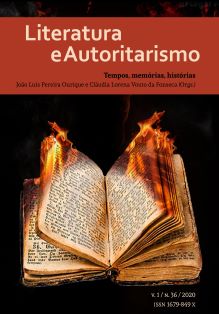
Literatura e Autoritarismo: Tempos, memórias, histórias
No. 36 (2020)A edição de número 36 da Revista Eletrônica Literatura e Autoritarismo publica textos que abordam a literatura em relação com a história e a memória, estabelecendo um diálogo necessário e relevante para a análise dos textos literários. -
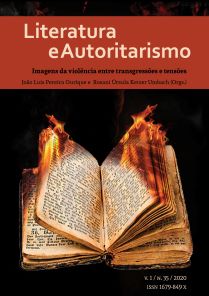
Literatura e Autoritarismo: Imagens da violência entre transgressões e tensões
No. 35 (2020)Issue 35 of Revista Eletrônica Literatura e Autoritarismo presents an articulation between several themes and relevant issues that are often in the background, but which are added to reflect and discuss from the literary production. With the title Images of violence between transgressions and tensions, this edition expands the image perspective from its representative character to the tangible when considering experiences based on the constant presence of violence.
-

Dossiê "1918: O fim do século XIX, 100 anos depois"
No. 24 (2020)100 years after the end of the conflict, a problem is imposed on the representation of the Great War: once all its survivors are gone, how to understand the unrepresentable and incommunicable experience of war? How to offer new readings and new representations when it is only possible to be anchored in second-hand representations? If 1918 is, as Hobsbawm understands, the “end of the 19th century”, how can we read this historical event today at the end of the 20th century?
-

Dossiê "Em torno da memória e do testemunho"
No. 23 (2020)O dossiê especial “Em torno da memória e do testemunho”, da Revista Eletrônica Literatura e Autoritarismo, reúne artigos que abordam aspectos conceituais com enfoque na relevância da memória e do testemunho dentro dos processos de construção do passado no presente.
-
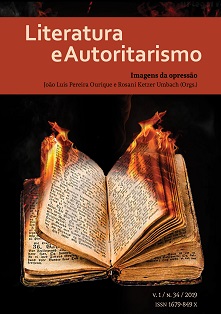
Literatura e Autoritarismo: Imagens da Opressão
No. 34 (2019)The 34th edition of the journal Literatura e Autoritarismo makes available to its readers a variety of texts that orbit the historical process of artistic and literary representation, discussing topics such as exile, trauma, violence.
-
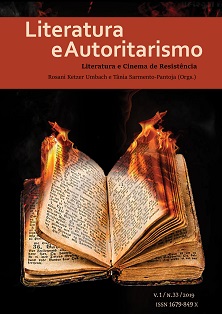
Literatura e Autoritarismo: Literatura e Cinema de Resistência
No. 33 (2019)Os séculos XX e XXI constituem, segundo Eric Hobsbawm e Márcio Seligmann-Silva, respectivamente, a era das Catástrofes e dos Testemunhos. Diante do olhar abismado frente às atrocidades experimentadas nesses dois séculos, resistir transformou-se em uma necessidade incontornável; por esse motivo, não seria exagero falarmos também em uma era das Resistências, categoria proposta por Augusto Sarmento-Pantoja, cujos formatos e performances são objetos da presente edição intitulada Literatura e Cinema de Resistência. -

Dossiê "Resistência e Distopia"
No. 22 (2019)In this issue of Revista Eletrônica Literatura e Autoritarismo, we have gathered in a dossier format a relevant set of articles proposing reflections based on the themes of Resistance and Dystopia. To integrate the discussions, which, despite their particularities, establish interconnected dialogues, we chose to divide the dossier into two parts, the first part being "Marks of violence and the testimony of resistance" and the second part, "Dystopias".
-

Dossiê "Catástrofe e Biopolítica na Literatura: Contribuições para a crítica literária"
No. 21 (2019)Neste dossiê, intitulado Catástrofe e Biopolítica na Literatura: contribuições para a crítica literária, uma coletânea de textos em formato de artigos movimenta um corpus de narrativas literárias analisadas conforme um conjunto de conceitos e categorias, dentre os quais destacamos: catástrofe, biopolítica, vida, morte, trauma, poder soberano e estado de exceção.
-

Literatura e Autoritarismo: Manifestações estéticas dissidentes
No. 32 (2018)In cultural terms, literature, cinema and the arts in general are fertile fields for dissident aesthetic manifestations, especially when originating from, or related to historical contexts of repression, characteristic of dictatorial regimes. This is what the articles that make up the present edition of the journal Literatura e Autoritarismo show.
-
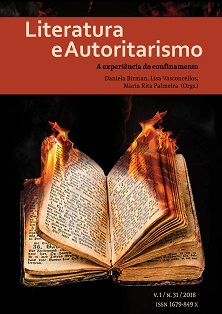
Literatura e Autoritarismo: A experiência do confinamento
No. 31 (2018)Nos últimos quinze anos, a população carcerária do país praticamente triplicou. As revoltas e os massacres que atingiam São Paulo se espalharam e hoje se dão em capitais menores, como Boa Vista e Fortaleza. De fato, estamos mergulhados numa crise ampla e generalizada, cujas proporções não conhecemos. Pois, diferentemente de outras “pautas”, esta não tem ganhado a percepção social que julgamos merecer, na grande imprensa, na grande política. Nesse contexto, consideramos fundamental refletir e elaborar o nosso passado prisional a partir, sobretudo, do nosso campo de estudo: a produção literária e cultural. -
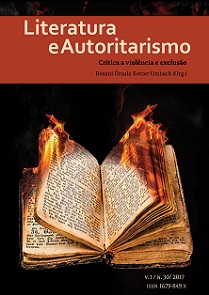
Literatura e Autoritarismo: Crítica a violência e exclusão
No. 30 (2017)The journal Literatura e Autoritarismo reaches its 30th issue with the July-December 2017 issue, comprising a variety of articles that, for the most part, deal with issues related to authoritarianism, prejudice, violence and their consequences on the social fabric, as a whole, and in individuals in particular.
-
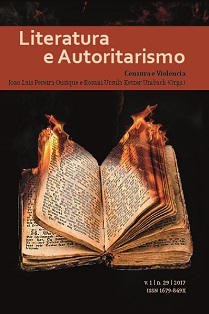
Literatura e Autoritarismo: Censura e Violência
No. 29 (2017)The 29th edition of the journal Literatura e Autoritarismo uses elements present in the texts that make up the January-June 2017 edition to compose a title that points to aspects that agree with the legitimation of censorship and violence, made even more clumsy if designed in a democratic environment, in which the rule of law must prevail.
-

Dossiê "Ressignificando Histórias"
No. 20 (2017)The dossier “Resignifying Histories” contains the Annals of the V Seminário de Literatura e Cinema de Resistência (SELCIR), bringing together complete works presented by the communicators, during the event held in November 2016 at the Federal University of Santa Maria (UFSM). The V SELCIR had financial support from CAPES and CNPq.support from CAPES and CNPq.


-
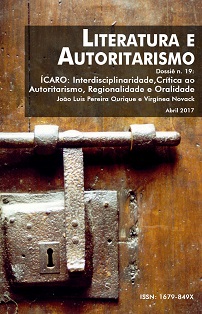
Dossiê "ÍCARO"
No. 19 (2017)This edition is finalized and will be published in 2017, the year in which the ÍCARO Group completes 10 years of regular and uninterrupted activities. The group is formed by researchers who seek to question certain power structures consolidated in our society. From this perspective, therefore, this set of texts developed between 2010 and 2017 shows a critical and theoretical unity, taking into account the peculiarities and perspectives present in each approach.
-

Dossiê "Fronteiras e Formas de Testemunho"
No. 18 (2017)O leitor encontrará nos artigos que compõem esta publicação aquela necessária inquietação teórica que move pesquisadores de diferentes partes do Brasil em direção às convergências entre conceitos como Literatura e História; Memória e Testemunho; Trauma e Ficção, entre outros.

